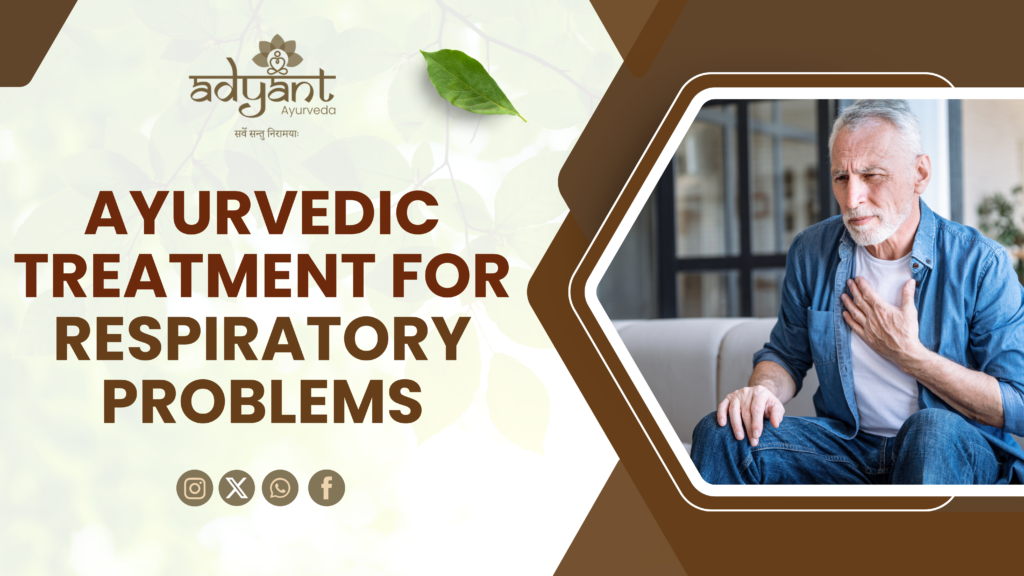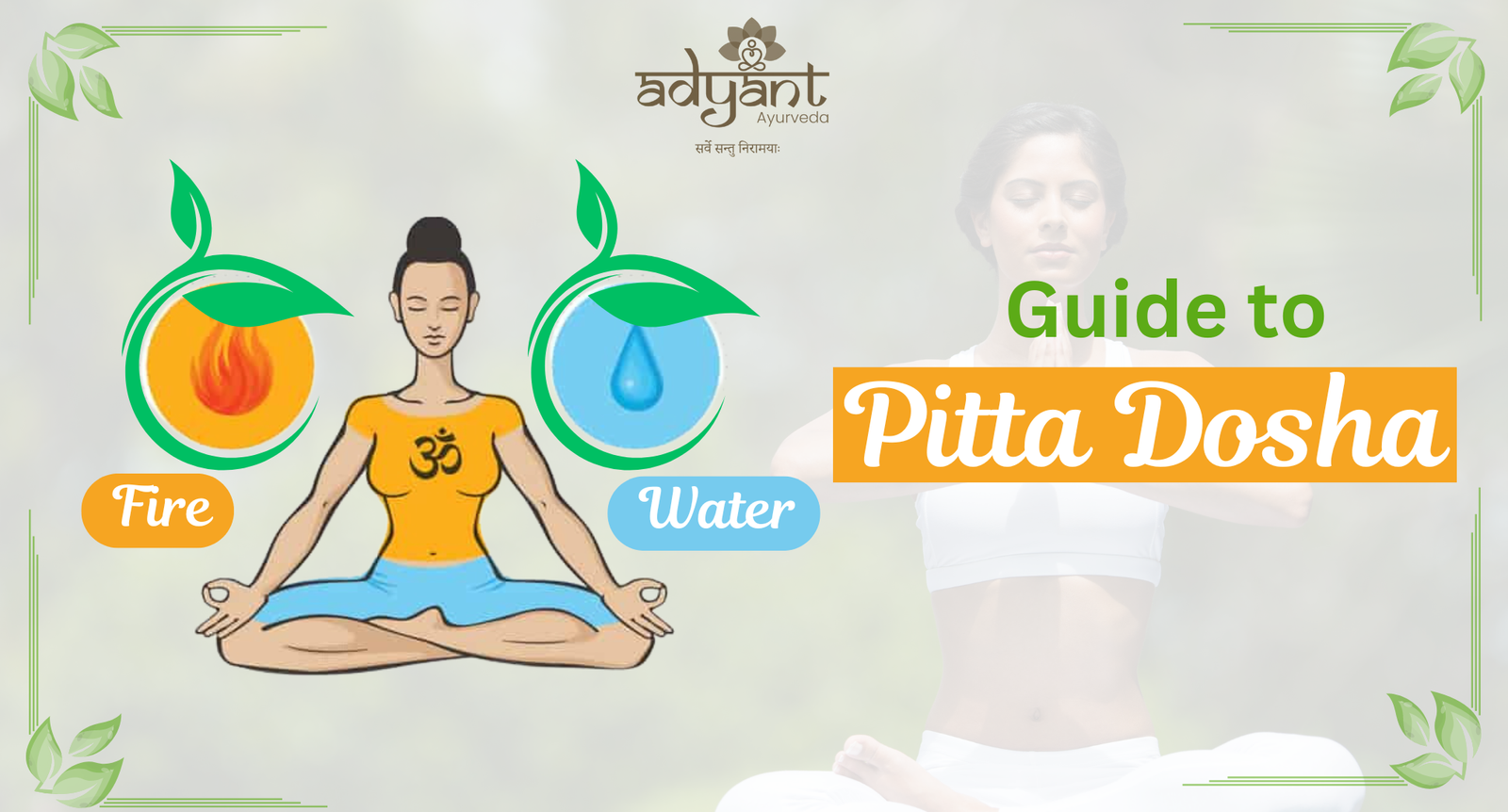Table of Contents
ToggleIntroduction to Respiratory Problems
Ayurvedic Treatment for Respiratory Problems: Respiratory problems such as asthma, chronic obstructive pulmonary disease (COPD), bronchitis, and allergic rhinitis are becoming increasingly common due to rising pollution levels, erratic lifestyles, and weakened immunity. While modern medicine provides symptomatic relief through inhalers, steroids, and antibiotics, many patients experience recurring episodes and side effects.
Ayurveda, the ancient Indian system of medicine, offers a comprehensive, natural approach to managing respiratory disorders. By addressing the root cause rather than just the symptoms, Ayurvedic treatment restores balance, detoxifies the system, and strengthens respiratory immunity.
Ayurvedic Understanding of Respiratory Diseases
In Ayurveda, respiratory diseases are primarily due to the imbalance of Vata and Kapha doshas in the Pranavaha Srotas (respiratory channels). Accumulation of Ama (toxic waste), weakened Agni (digestive fire), and external triggers like dust and smoke obstruct the flow of Prana (vital life force), leading to breathing difficulties, congestion, and chronic coughing.
Key Disorders:
- Tamaka Shwasa – Equivalent to asthma and COPD
- Kasa Roga – Types of cough due to doshic imbalances
- Peenasa – Chronic and allergic rhinitis
- Shwasanaka Jwara – Viral respiratory infections
Ayurvedic Classification of Respiratory Disorders
Ayurveda classifies respiratory conditions based on nature, severity, and doshic involvement. In Shwasa Roga (dyspnea/breathing disorders), these types are described:
- Urdhva Shwasa – Difficulty during exhalation (e.g., obstructive lung diseases)
- Chhinna Shwasa – Irregular breathing, seen in anxiety/panic
- Maha Shwasa – Severe gasping breathlessness
- Tamaka Shwasa – Asthma-like symptoms (Kapha-Vata dominance)
- Pratamaka Shwasa – Fatal breathlessness, incurable
Types of Cough (Kasa Roga) in Ayurveda
| Type | Symptoms | Herbs |
|---|---|---|
| Vataja Kasa | Dry cough, chest pain | Vasa Haridra, Bala Taila |
| Pittaja Kasa | Burning sensation, yellow sputum | Yashtimadhu, Amalaki |
| Kaphaja Kasa | Wet cough, heaviness | Sitopaladi, Talisadi, Vamana if needed |
Causes of Respiratory Problems (Nidana)
- Exposure to allergens, cold air, pollution, smoke, and dust
- Consumption of incompatible foods (e.g., curd at night, oily/cold foods)
- Weak digestion and accumulation of Ama
- Suppression of natural urges
- Sedentary lifestyle and stress
- Genetic predisposition and low immunity
Diagnosis in Ayurveda
Ayurvedic diagnosis is holistic and personalized. Key methods include:
- Nadi Pareeksha (pulse diagnosis)
- Ashta Sthana Pareeksha (eight-fold examination)
- Prakriti-Vikriti Analysis (constitution & imbalance)
- Samprapti Ghatakas (understanding pathogenesis)
- Detailed history of lifestyle, diet, and environment
Integration with Modern Diagnostics
Modern parameters enhance Ayurvedic evaluation:
- FEV1 / FVC Ratio – Asthma/COPD
- Pulse Oximetry (SpO2) – Oxygen saturation
- CBC, ESR, AEC – Inflammation/allergy markers
Treatment Principles
1. Shodhana (Cleansing & Detoxification)
- Vamana – For Kapha disorders like asthma
- Virechana – Eliminates excess Pitta and mucus
- Nasya – Nasal administration of medicated oils
- Abhyanga & Swedana – Oil massage & steam to loosen toxins
2. Shamana (Pacification Therapy)
- Herbal formulations to balance doshas and relieve symptoms:
Sitopaladi Churna, Talisadi Churna, Yashtimadhu, Vasa Haridra
3. Rasayana (Rejuvenation Therapy)
- Strengthen immunity & restore lung function:
Chyawanprash, Pippali Rasayana, Guduchi, Ashwagandha
Ayurvedic Medicines and Herbs for Respiratory Health
| Condition | Ayurvedic Medicines / Herbs |
|---|---|
| Asthma / COPD | Agastya Haritaki Avaleha, Sitopaladi Churna, Pippali Rasayana |
| Cough (Kasa) | Yashtimadhu, Vasa Haridra Churna, Talisadi Churna |
| Allergic Rhinitis | Anu Taila, Trikatu, Pathyadi Kwath |
| Immunity & Prevention | Chyawanprash, Tulsi, Ashwagandha, Guduchi, Pippali |
Yoga and Pranayama for Respiratory Support
Pranayama:
- Anulom Vilom – Improves lung capacity
- Bhastrika – Expels toxins, strengthens lungs
- Kapalbhati – Clears nasal passages
- Bhramari – Soothes nerves, aids rhinitis
Yoga Asanas:
- Bhujangasana, Matsyasana, Tadasana, Trikonasana
Diet and Lifestyle Recommendations
To Eat:
- Warm, cooked meals
- Soups with ginger, turmeric, and black pepper
- Herbal teas: Tulsi, Mulethi, Pippali
- Honey in lukewarm water
To Avoid:
- Cold, raw, or refrigerated foods
- Dairy products like curd at night
- Heavy, oily meals
- Sleeping after meals
Daily Practices:
- Nasya with Anu Taila
- Oil pulling (Gandusha)
- Early dinner
- Meditation for stress
Post-COVID Ayurvedic Care
- Pippali Rasayana, Chyawanprash, Dashamoola Kwath for lung strength
- Gentle Nasya and steam therapy
- Light diet, regular Pranayama
Case Studies from Ayurvedic Practice
- COPD: A 57-year-old male improved after Virechana & Pippali Rasayana. The CAT score reduced from 30 to 9.
- Asthma: A 45-year-old female on Agastya Haritaki Avaleha showed improved FEV1 (from 27% to 49%)
- Vataja Kasa: Cough resolved after Vasa Haridra Churna; hemoglobin and eosinophils normalized
Preventive Measures in Ayurveda
- Seasonal Panchakarma (especially Spring & Autumn)
- Chyawanprash during weather changes
- Herbal fumigation (Dhoomapana)
- Avoid Viruddha Ahara (incompatible food combinations)
- Daily Pranayama & Nasya
Oils for Nasya & Steam at Home
| Purpose | Oil |
|---|---|
| Daily Prevention | Anu Taila |
| Allergies/Sinusitis | Shadbindu Taila |
| Dry Cough | Bala Taila |
| Steam | Dashamoola Oil |
Ayurvedic Home Remedies for Respiratory Problems
| Condition | Remedy | How to Use | Benefit |
|---|---|---|---|
| Dry Cough | Vasa Haridra Churna + Honey | 1 tsp + 1 tsp, 2x/day | Soothes throat |
| Turmeric Milk | ½ tsp turmeric in warm milk | Anti-inflammatory | |
| Ginger Tea + Honey | Boil ginger slices; add honey | Relieves dryness | |
| Wet Cough | Sitopaladi + Honey | 1 tsp with honey 2x/day | Expectorant |
| Trikatu + Warm Water | ½ tsp post-meals | Reduces Kapha | |
| Herbal Steam (Tulsi, Ajwain) | Inhale steam | Clears nasal blockage | |
| Allergic Rhinitis | Nasya with Anu Taila | 2 drops daily | Strengthens immunity |
| Tulsi-Ginger Tea + Pepper | Sip warm | Relieves congestion | |
| Dhoop (Dhoomapana) | Burn neem, cow dung, guggul | Purifies air | |
| Asthma | Agastya Haritaki Avaleha | 1 tsp 2x/day | Reduces breathlessness |
| Licorice Decoction | Boil 1 tsp in water | Reduces inflammation | |
| Pranayama | 10–15 mins daily | Improves oxygenation | |
| Post-COVID | Dashamoola Kwath | 50 ml 2x/day | Supports lung recovery |
| Pippali Rasayana | 1–2 g with honey 2x/day | Immunity booster | |
| Chyawanprash | 1 tsp every morning | Builds strength |
General Tips
- Stay hydrated with warm Tulsi or cinnamon water
- Avoid cold food and drinks
- Keep chest warm
- Use humidifiers or herbal steam
- Maintain a consistent sleep routine
Cautions and Contraindications
- Panchakarma is not recommended for:
- Pregnant women
- Very weak individuals
- Children (without supervision)
- Nasya is not to be done during fever or right after meals
- Avoid self-medication with strong herbs like Trikatu without supervision
- Always consult an experienced Ayurvedic physician
You can also read:
- Asthma Treatment in Ayurveda
- Ayurvedic Management of Bronchial Asthma
- Ayurvedic Treatment for Bronchitis
FAQs – Ayurvedic Treatment for Respiratory Problems
Is Ayurvedic treatment safe for asthma patients?
Yes, when guided by a qualified Ayurvedic doctor, it can be safely combined with allopathy.
How long does it take to see results?
Acute cases: 2–4 weeks. Chronic: 2–3 months or more.
Can Ayurveda completely cure COPD or asthma?
No. These are Yapya Vyadhis (manageable). Ayurveda significantly improves the quality of life.
Do I have to undergo Panchakarma for all respiratory issues?
No. Many mild to moderate cases respond well to herbal and Nasya therapies.
What is the role of Nasya therapy?
Nasya clears Kapha from the sinuses and improves breathing.
Can I continue my inhaler alongside Ayurvedic medicines?
Yes. Do not stop allopathic medications without consulting both doctors.
Is Ayurvedic treatment suitable for children?
Yes, with proper guidance and age-appropriate remedies.
What foods aggravate respiratory issues?
Cold items, curd at night, fruit + milk combos, fried foods.
How does Ayurveda prevent frequent infections?
By detoxifying the system, improving digestion, and boosting natural immunity.
Can lifestyle changes alone manage early-stage asthma/allergies?
Yes. Early intervention with diet, Pranayama, and Nasya can control symptoms.
Conclusion – Ayurvedic Treatment for Respiratory Problems
Respiratory diseases can significantly impact your quality of life. Ayurveda offers a holistic, safe, and natural way to manage these conditions by addressing the root cause through Shodhana, Shamana, and Rasayana therapies.
By embracing Ayurvedic wisdom—rooted in balance, nature, and self-care—you can breathe freely and live fully.
Adyant Ayurveda: Expert Respiratory Care in Bangalore
Adyant Ayurveda offers personalized Ayurvedic treatment for asthma, COPD, cough, and allergic rhinitis using authentic Panchakarma therapies, herbal formulations, and diet/lifestyle counseling.
Branches: Jayanagar, Indiranagar, Kalyan Nagar, Rajarajeshwari Nagar
Book Appointment: +91-9972541009
Online Consultations Available
Let us help you breathe better, naturally, and holistically.









